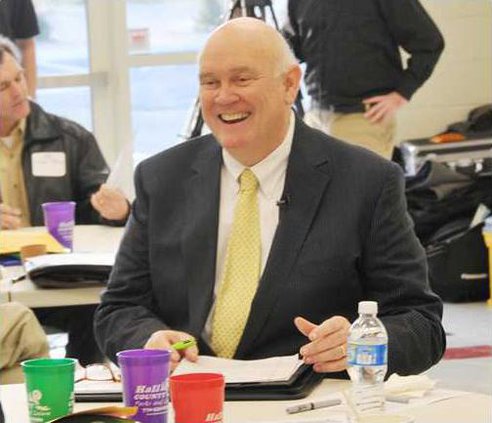FLOWERY BRANCH — Dismissing moves to resolve the tri-state battle over Lake Lanier’s water, Board of Commissioners Chairman Tom Oliver touted in his State of Hall County speech Thursday sped-up plans to build the Glades Farm Reservoir.
“We think we can create enough water there ... to serve Hall County for the next 50 years,” he said.
“And I promise you, if you want ... a great job, you’re going to be able to find it in Hall County because we’re going to have the water.”
Oliver made the remarks at the Greater Hall Chamber of Commerce’s South Hall Business Coalition, meeting at the county’s new Mulberry Creek Community Center off JM Turk Road.
He went on to say the county hopes to have a permit within 20-25 months to go forward on the project on the Glades property.
“That’s where we’re so strong. We have the footprint for a reservoir. ... We have the land,” he said.
Later Thursday, Hall commissioners agreed after a closed-door session to enter into negotiations to purchase another 105 acres at approximately $5,600 an acre for expansion of the planned Glade Farms Reservoir project, which currently includes 750 acres in North Hall. Plans for the reservoir have grown from 7 million to 50 million gallon capacity with a goal of selling water to other municipalities. The county is also taking over the permitting application process from the private owners of Glade Farms.
The project will help Hall County prepare for the fallout from a federal judge’s ruling last year declaring metro Atlanta’s water withdrawal from Lake Lanier an unauthorized use.
Oliver said he didn’t think the ruling will cut off the spigot altogether but will cap future withdrawals.
“I don’t think we will get any results with the three governors meeting (on the issue),” he said, referring to talks among Georgia, Florida and Alabama. “And I don’t think we will get any results out of Congress.
“Why does Alabama and Florida care if we’ve got water in North Georgia? If I’m one of the governors, why do I want to work out a deal to come back and give the water back to Georgia?”
Oliver said Hall County expects Hall and Gainesville to team up on the reservoir effort, with Gainesville serving as the water supplier and Hall “being the wholesaler, a concept that is moving forward.”
“We’ve got a great team. We’ve got some of the best engineers we hope we can find,” he said.
Oliver also talked about getting local legislation regarding Hall County’s share of sales taxes.
“We’re not getting our fair share and so ... we are pushing to collect our own sales tax,” he said. “We are thinking that ... about 30 percent in revenues are not coming back to Hall County.”
Oliver said the county is pushing for a meeting this month involving Hall County’s local government and school leaders on the matter.
Phil Sutton, Hall’s assistant administrator, said after the speech that the enabling legislation would affect all Georgia counties. The bill would give counties the option of hiring a private contractor to collect the taxes.
“One percent of the sales tax collection goes to the state to pay for (administrative and auditing costs),” Sutton said. “We would ask that the legislation also allow us to retain that 1 percent in order to cover our costs of collection.”
Oliver was generally upbeat in other parts of his speech, saying that “we’re seeing revenues creep up a little bit,” an improvement that could allow the county to ease up on furloughs, or unpaid days all county employees are having to take.
He also tipped his hat to progress made in other cities, including commercial development in Flowery Branch, Georgia Department of Transportation improvements in Oakwood and a burgeoning sewer project in Lula.
“I apologize to the people south of us, but ... I don’t want to live in Atlanta. I don’t want to live in Gwinnett,” he said. “I like what we’ve got here. I like the job opportunities we present here.”

